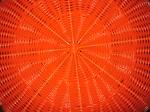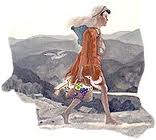
the trays to the owners. However, when the poor brought their fruit in reed baskets the Kohanim would not return the baskets to them. This appears to be one of life's typical inequities -- the rich get richer and the poor get poorer.
But is there a deeper intent behind this set-up?
For me, deeper reasons usually arise from consulting my own experience. I think of my own first fruits. I have been living here in Israel for a number of years now…And what do I have to show for it? What can I really offer up?
And I must admit I feel empty at times. But not a desperate or meaningless emptiness. Rather the emptiness of a vessel which has just been built; a vessel just waiting to be filled. Life here feels like an extended exercise in building my vessel to hold greater light; constantly weaving my metaphorical basket. And it takes diligent labor to set a foundation, to weave a receptacle to receive spiritual bounty.
This laborious time spent constructing the basket is not to be underestimated. The Mevo Sharim says, “The holiness of the vessel is greater than that of the lights which it contains.” Usually one thinks of the vessel as being secondary to the light (as the wine glass is to the wine). But the Mevo Sharim turns that notion upside-down…stating that it is the vessel (the basket) which is even more precious than the light (the offerings inside).
This answers our question of why the Priests would keep the baskets of the poor. For their baskets, their strivings to create themselves as vessels in the world, were such an integral and sacred part of their offerings. All of our work to build foundations, though rich and elaborate it may not be, is sacred work. All the more so when we have struggled mightily in the building...and all the more so when we brave the challenges of poverty, as opposed to caving to the seductions of comfort.
It seems that God has little need of the silver trays of the rich and all they symbolize. The Priests keeping the meager baskets of the poor show that those thankless hours of labor, sweat and struggle are also received on high, as vaulted and valued as the fruits themslves. More precious than silver, the effort-imbued baskets are integral to the gift.
Wicker Strong
I have woven wicker works
From the fabric of this Land
like natted nest of bird
built of stick & string
I have gathered
goods together
Fit for first fruit offerings
Sewn foundations
of stalk and hay
awkward armfulls
are my hours
empty archways are my days
I've worked
cleaning open windows
For only emptiness receives
And for the sake of offering
I weave
I weave a basket
a braided tevah
with bitumen blackened brow
- having drawn myself from river
- having planted self with plow
I have toiled to build a tenah
A basket firm for future fruits
I've wed a fertile womb
I’ve cleared a field
but set no root
And every newborn morning
I’ve born the burden of one more stitch
To beautify this basket
- To offer it -
And I proclaim
With my pain
empowered
empty hands
I have offered all that I could reap
From this steep God given land
I have brought my first of fruits…
An empty basket in my hands.
Behold the hands that hold it
Are rock rough, cut and soiled
and noughts the fruit I offer
for nought can not be spoiled
I am empty as an echo
Resounding cavernous and clear
I - an open basket
May my offering draw me near
To but build a basket
a vassal vessel to the King
To labor long to weave it
And all along - to sing
That the holiness of the vessel
Far exceeds what rests inside
This Land has made me build myself
The fruits will grow in time

 RSS Feed
RSS Feed
